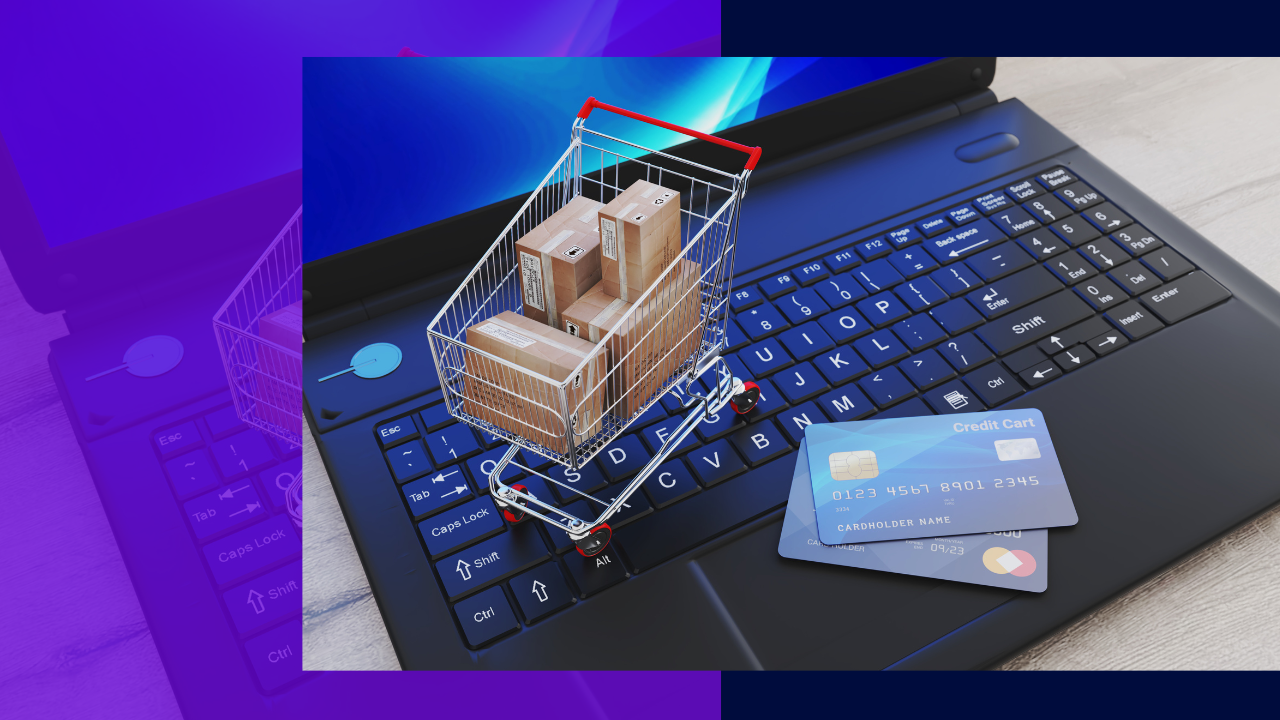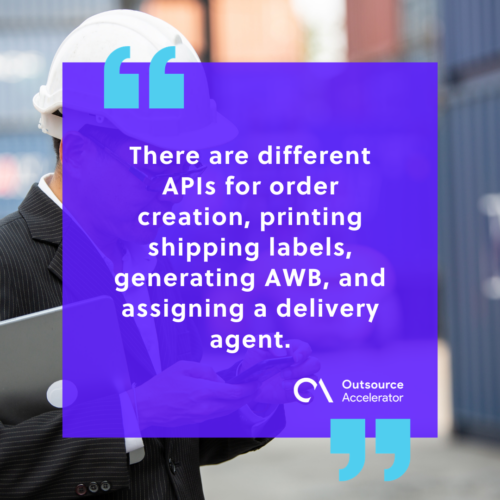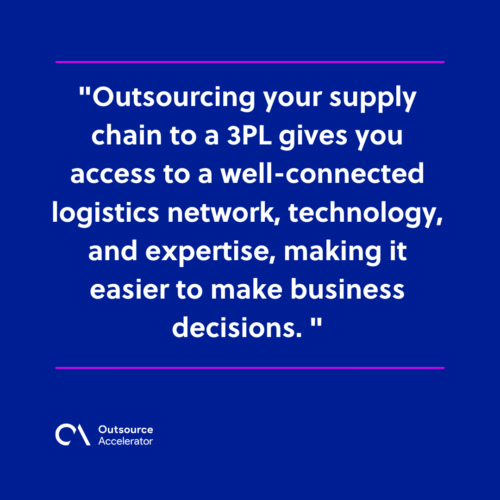How outsourcing optimizes e-commerce logistics and supply chain management

This article is a submission by Laboratory Billings, an industry-leading laboratory billing service company. Laboratory Billings‘ mission is to help lab technicians realize their significance and growth opportunities for their business.
Outsourcing to save time and money is growing in e-commerce as the world becomes more connected and complex.
Outsourcing is paying another company to handle a business task in hopes of better efficiency and quality.
This is helpful for logistics and supply chain management, which many entrepreneurs and e-commerce owners overlook.
E-commerce relies on logistics and supply chain management, so outsourcing logistics to experts may be a good option for some owners.
Partnering in outsourcing is crucial. Trusting an e-fulfillment company with your e-commerce logistics lets you focus on what you do best.
Supply chain and logistics management require careful planning, cost analysis, and experience to optimize. Third-party logistics (3PL) providers care about your company’s success.
Think of them as a partner dedicated to improving your logistics, not a service provider.
5 reasons to outsource e-commerce logistics and supply chain management
Outsourcing provides the following advantages:
1. Cut costs by gaining experience
Even the largest e-commerce companies know time is money. Good logistics team training, implementation, and optimization are expensive.
Instead, use an externalized logistics company to access a team of experts with experience you may lack. Externalizing for international export can make this especially true.
An established logistics company in your target country gives you insider customer market knowledge. Working with an external logistics company gives you direct access to experienced professionals.
Optimization can make inventory and logistics more expensive. Renting and staffing facilities is expensive, especially for smaller e-commerce sites.
Third-party logistics providers have logistics experts and warehouses to handle your order volume.

2. Using the 3PL’s size to your advantage
Leveraging 3PL resources is a major advantage. A logistics company has an exclusive carrier network for the best inventory transportation. Companies exporting to Europe can use top EU carriers and unique regional delivery methods.
3PL companies can consolidate shipping and save customers on costs. They can negotiate lower fuel surcharges and obtain shipping discounts by grouping multiple customers into the same freight.
3. Access to software and technology
Choosing the right back office software can be challenging and costly for effective e-commerce logistics operations. Shipping and logistics are often overlooked.
The TMS of the 3PL providers focuses on logistics and supply chain management. They have done the research and investment in a good TMS.
You can gain access to it by forming a partnership with a third-party logistics provider.
3PL providers offer data to analyze logistics optimization and improve customer response. They offer shipping optimization data and detailed freight reports.
This helps analyze customer shopping habits and track service quality for deliveries. Track customer feedback and respond easily.
4. Profit from logistics innovation
Your logistics provider will innovate to help your business grow while you focus on customer needs, marketing, and improvement.
Supply chain management is always changing in a globalized world.
Reputable 3PL providers innovate to improve efficiency for your business. Your partnership with an e-fulfillment service provider gives you a dedicated team of logistics experts.
5. Risk management
Partnering with a 3PL reduces risk. E-fulfillment companies handle inventory storage and product delivery. 3PL providers handle carrier contracts, safety regulations, and insurance administration.
Technology and e-commerce logistics
Logistics industry started in the 1980s and has evolved over time. In the 21st century, e-commerce logistics revolutionized the logistics industry.
New concepts, streamlined delivery, and technological advancements were all included in this upgrade.
In e-commerce, API integrations, user interfaces, and AI systems aid logistics tasks like choosing the right delivery company and handling delivery issues.
How does technology change e-commerce logistics?
Technology has transformed logistics. Ecommerce businesses use logistics to meet customer needs. Soon, the logistics industry sought help from tech experts.
AI-driven courier selection
Choosing the right logistics partner is challenging. Determining order allocation among multiple logistics partners can be complex.
Artificial intelligence-driven courier recommendation engines are utilized by intelligence platforms and logistics aggregators.
To locate a shipping partner that is suitable for the order, courier recommendation engines use predetermined criteria such as price and serviceability.
ClickPost and similar platforms provide AI-powered courier recommendation engines. These engines use historical data to help you choose a logistics company based on factors like:
- Delivery time
- SLA breaches
- Stuck shipments
Boost order fulfillment while simultaneously lowering logistics expenses.
Manifestation over APIs
E-commerce logistics partners have multiple APIs for different order aspects. There are different APIs for order creation, printing shipping labels, generating AWB, and assigning a delivery agent.
In order to ensure a smooth order manifestation, integrate APIs.
E-commerce companies have the option of integrating with logistics partners or utilizing a platform that is already integrated.
In order to facilitate the entire manifestation process, ClickPost is a platform that provides e-commerce businesses with a single API integration possibility.

Automated tracking updates for customers
E-commerce businesses struggle with order tracking communication.
Customers eagerly await their orders. They are kept excited and anticipating their orders by being provided with real-time tracking updates.
APIs and tools provided by logistics partners can be utilized by e-commerce businesses in order to track shipments for their customers.
The real-time tracking of data from logistics partners is accomplished through the use of Push and Pull integrations by third-party tools. You can track everything yourself instead of relying on logistics partners for updates.
Automate tracking updates for real-time customer notifications.
AI detects delays and stuck shipments
Customers and businesses alike recognize the significance of order-tracking technologies. SLA violations, such as delays and stuck shipments, can be identified through the monitoring of orders while they are in transit.
In the absence of order monitoring, 50% of service level agreement (SLA) breaches are either missed or not reported.
AI tools can identify SLA breaches and their causes. This helps partners and businesses handle SLA breaches and reduce delayed shipments and RTO percentage.
NDR automation
When delivery fails, an NDR is sent to the e-commerce business with details of the failed attempt and the reasons. Reasons for failed deliveries can include:
- Customer unavailability
- Incorrect address/contact information
- Customer refusal
Fake delivery attempts may occur when a delivery agent falsely claims to have tried delivering an item without actually doing so. Multiple tech interventions can greatly improve order fulfillment percentage.
A tech-enabled NDR management system gets real-time failed delivery information from the logistics partner’s platform using APIs.
NDRs prompt queries to customers for successful next delivery. The updated information is sent to the logistic partner for smooth delivery.
Automated process reduces call center costs by 10% and RTOs by 20%.
Benefits of outsourcing supply chain management
Outsourcing supply chain management helps businesses with the following:
Reduce costs overall
The management of the supply chain requires a variety of processes and labor in order to ensure a smooth supply chain. Logistics costs can quickly add up if not done right.
Supply chain outsourcing reduces e-commerce logistics management, warehousing, fulfillment, and shipping costs. Unstrategic supply chain management is costly. Logistics tenants expect a 10% warehouse rent increase in 2021.
Inefficient inventory storage, geographic footprint, labor, and operations can cause logistics issues.
Affordable warehousing, automated fulfillment, and discounted shipping can be solved by outsourcing the supply chain to a tech-enabled 3PL.
Makes time for business scaling
Outsourcing your supply chain frees up time for online marketing, product development, and customer support.
As your business grows, a 3PL can improve inventory and fulfillment by adding more centers, setting up subscription orders, and entering new markets and sales channels.
Accelerates the shipping process
By outsourcing the supply chain, e-commerce businesses are able to provide shipping that is both affordable and quick, thereby expanding their customer base and meeting their expectations.
Working with a third-party logistics provider with a broad network allows you to spread your inventory across multiple fulfillment centers.
By storing inventory in a number of different strategic locations, shipping distance and costs can be reduced. This results in better shipping incentives, such as free shipping and ground shipping that takes two days.
Increases flexibility
Outsourcing your supply chain to a 3PL gives you access to a well-connected logistics network, technology, and expertise, making it easier to make business decisions.
Third-party service providers make expanding into new US and international locations easy.
There are no monthly order minimums to open outsourced fulfillment to startups. You can use standard or branded custom packaging and monitor and change inventory or orders from one dashboard.

Makes order processing more accurate
In order to simplify order processing, 3PLs have software that can sync with your online store and other sales channels, whereas smaller e-commerce businesses always have to process orders manually.
Through outsourcing, you can send orders to a fulfillment center in an automated fashion, allowing for expedited picking, packing, and shipping.
Increases customer satisfaction
Customers don’t see how orders are processed, fulfilled, and shipped, but an efficient supply chain benefits them.
Leave e-commerce logistics to the experts to save money and improve customer satisfaction with faster delivery and more accurate orders by outsourcing your supply chain.
Transforming e-commerce logistics and supply and chain management
The dynamic landscape of e-commerce requires strategic logistics and supply chain management.
As the world becomes more interconnected and technology advances, e-commerce owners turn to outsourcing to streamline operations, improve efficiency, and cut costs.
An experienced workforce, economies of scale, and advanced technologies are invaluable benefits of a third-party logistics partnership.
Outsourcing logistics saves money and lets companies use the expertise of logistics experts who navigate complex international markets.
Integration of technology transforms e-commerce logistics. Optimization of courier selection, API manifesting, tracking updates, delay detection, and NDR management depend on AI and machine learning.






 Independent
Independent




